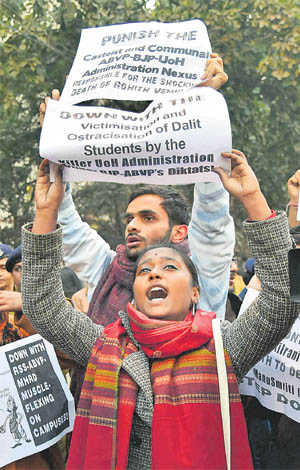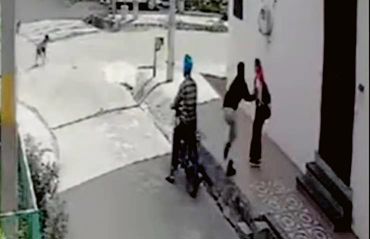
Students of the ASA protest against Rohith’s suicide. PTI
M Rajiv Lochan
On the eve of the Republic Day, this year, President Pranab Kumar Mukherjee said: “Let us continue to complain, to demand, to rebel.” Pranab Babu must have known while crafting his address to the nation that Indians need no encouragement to protest and complain. If anything, they need to be taught that while complaining is just the one step towards identifying what is wrong with things, complaints per se are fatuous, unless accompanied by an understanding of what needs to be changed and how. Perhaps the President forgot Jawaharlal Nehru's words in the Rajya Sabha in 1958, spoken in defence of the erstwhile Chief Minister of Punjab, Sardar Partap Singh Kairon, when his detractors within the Congress like Bhimsen Sachar and Lala Jagat Narain began charging Kairon with corruption without any basis.
Indians complain today, Nehru said, in order to express their private pique rather than for creating something new. He advised the complainers to realise that now, in Independent India, they were the government and it was for them to take the country forward. Making baseless complaints just for the sake of complaining was not the way forward for India. Later, the same year Nehru would warn the people of Punjab in a public speech: “This is your country. You have to bring about the change. Merely complaining is not going to result in the change”.
At the level of the individual, we notice the unfortunate case of the suicide of a student at the University of Hyderabad. Inter alia, it shows up the dangerous vapidity of this culture of protests that marks India in general and India's institutions of higher learning in particular. It can push someone who is already in trouble for other reasons to take his own life in despair.
In the Indian system of higher education, the culture of protest has been so deeply ingrained that someone innocent of its fatuousness might be lulled into believing that Indian scholars are doing a lot of questioning of the Establishment, considerable heart searching, trying to discover the roots of problems and working towards solutions or, at least, developing skills for a critical understanding of social phenomenon. Or, perhaps, they are improving their intellectual capabilities.
The reality is that that would be a complete misunderstanding of how things work in India. The ever-argumentative Indians are not trying to use arguments to reach a higher truth or even hone skills towards finding a solution to problems that they may have identified. They are merely being captious, finding fault for the sake of finding fault, indulging in arguments for the pleasure of being contrarian. And in this they are following a long-standing indigenous historical tradition in which debates and verbal jousting were considered to be just another form of entertainment for the accomplished. The shastrartha, often carried out in a public space or the sovereign's court, was more a device to entertain the audience rather than an effort to discover any truth.
In India, arguments exist for their own sake. When arguments start getting a tad serious they turn into protests. The protests too, in turn, exist for their own sake. Without any reference to any objective. Without any consideration for how any objective might be attained or who would make an effort to achieve the objective. Nowhere is it better illustrated than among the university-based Indians who have for long been caught in a morass of censoriousness and condemnation. Condemn capitalism, condemn imperialism, condemn oppression, condemn religion, condemn secularism, condemn farmers' suicide, condemn use of improved techniques in agriculture, condemn reservation, condemn the non-implementation of reservation, condemn Sonia Gandhi, condemn Narendra Modi.
Such a censorious mode comes from the traditions of the national movement but, with one big difference. The leaders of the national movement ended up doing in-depth research, while being censorious of social or government actions and inactions. They unpacked the structures underlying whatever the problem was. The report on the Kanpur Riots of 1931, prepared by the Indian National Congress, became one of the most powerful analysis of communalism in modern India. Numerous analyses of the economic impact of colonialism sensitised Indians to the cussed manner in which India's imperial connection was draining the wealth of India. Unpacking the structures of ancient traditions helped them create buttresses for essential social reforms in India and defeat the forces of obscurantism that the colonial government encouraged in the name of Indian traditions.
The universities of Independent India are quite far off from those practices of the national movement. The Jawaharlal Nehru University provides a good example. Many professors in that university believed, through the 1970s, that the objective of the university was to encourage students to become part of the activist cadre for the Left parties. Recently, Professor Jagdishwar Chaturvedi currently of the Calcutta university, former president of the JNU Students' Union, said it in so many words in his posts on Facebook in praise of the noted scholar of Hindi, Professor Namwar Singh. My own teacher, Professor Satish Saberwal in his autobiographical interview published in the Contributions to Indian Sociology recalled this idea and noticed that the focus was on creating a cadre of political workers, it was a bonus if some of the students also ended up being equipped with critical thinking.
At least in the JNU students adsorbed some critical thought seeing the intellectual practices of their highly research-oriented teachers. In other universities the students merely ended up being cannon fodder for political parties.
The writer is a Professor in the Department of History, Panjab University, Chandigarh.



























